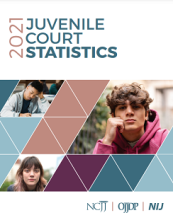Jurisdiction
Jurisdiction Site and Sentence Disparity - Executive Summary
Pretrial Decisions - A Contextual Analysis of Central Intake Systems
The Daunting Task of Strengthening Medical Examiner and Coroner Investigations Across Hundreds of Jurisdictions
Juvenile Court Statistics, 2021
Tribal Crime, Justice, and Safety, Part 2
Stacy Lee Reynolds and Christine (Tina) Crossland continue their discussion of tribal crime, justice, and safety, including how Native American persons experience crime victimization at higher rates than non-Native people and the jurisdictional complexities in responding to tribal crime, justice, and safety. Read the transcript.
Listen to the first half of Stacy and Tina’s discussion.
Reading and Resources from NIJ
Tribal-Researcher Capacity Building Grants
Tribal Crime, Justice, and Safety, Part 1
Research indicates that Native American persons experience crime victimization at higher rates than non-Native people. Furthermore, the unique position of American Indian and Alaska Native tribes as both sovereign nations and domestic dependents of the U.S. creates jurisdictional complexities in responding to crime, justice, and safety. Senior social and behavioral scientist Christine (Tina) Crossland discusses NIJ’s research on these topics, especially on the prevention of violence towards American Indians and Alaska Natives. Communications Assistant Stacy Lee Reynolds hosts.
License Plate Reader (LPR) Police Patrols in Crime Hot Spots: An Experimental Evaluation in Two Adjacent Jurisdictions
Booker and Beyond Analyzing Sentencing Reform and Exploring New Research Directions
This webinar features a discussion of previously published research on the U.S. Supreme Court’s 2005 Booker decision - which effectively transformed the United States Sentencing Guidelines from a mandatory, to an advisory, system. The presentation will address selected research findings from the last 15 years. Individual participants will briefly review their previous research findings with particular attention paid to the analytic methods used.
See the YouTube Terms of Service and Google Privacy Policy
Multilevel Evaluation of Project Safe Neighborhoods
Project Safe Neighborhoods (PSN) is a DOJ-sponsored initiative to reduce violent crime, particularly gun crime, by fostering cooperation by criminal justice agencies and local partners to develop and implement strategic approaches.
See the YouTube Terms of Service and Google Privacy Policy
Implementing NAGPRA Connecting Medical Examiner and Coroner Offices to Tribal Partners
This project is designed to connect tribal partners to ME/C offices to facilitate successful disposition protocols for non-forensically significant Native American remains that are compliant with the Native American Graves Protection and Repatriation Act of 1990 (NAGPRA).
See the YouTube Terms of Service and Google Privacy Policy
Dual System Youth: At the Intersection of Child Maltreatment and Delinquency
Across the country, child welfare and juvenile justice systems now recognize that youth involved in both systems (i.e., dual system youth) are a vulnerable population who often go unrecognized because of challenges in information-sharing and cross system collaboration. In light of these challenges, national incidence rates of dual system youth are not known.
See the YouTube Terms of Service and Google Privacy Policy




